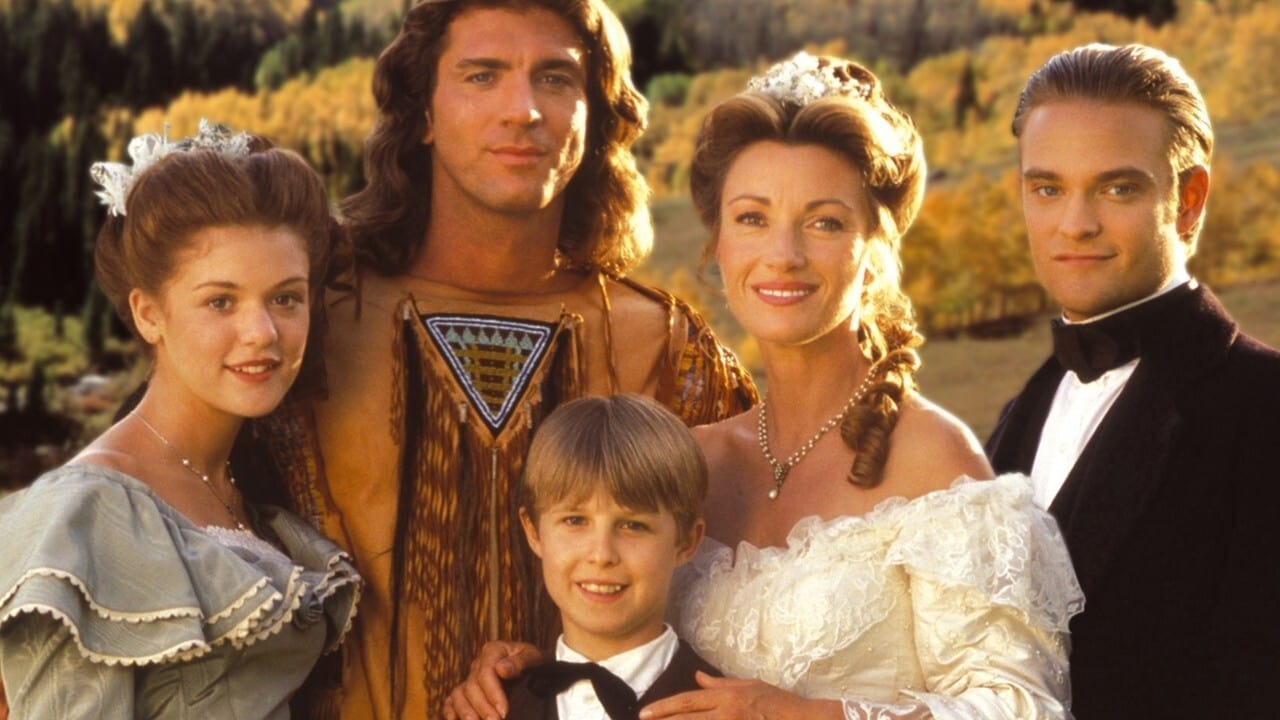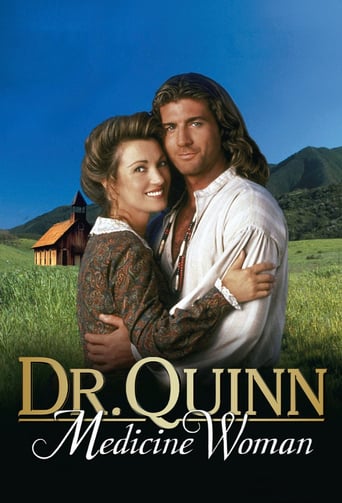Matialth
Good concept, poorly executed.
TeenzTen
An action-packed slog
Ogosmith
Each character in this movie — down to the smallest one — is an individual rather than a type, prone to spontaneous changes of mood and sometimes amusing outbursts of pettiness or ill humor.
Marva-nova
Amazing worth wacthing. So good. Biased but well made with many good points.
Skekz
Spoilers****** I have a love/hate relationship with this show. I stuck with it to watch the romance between Sully and Dr. Quinn, if not for that I would have given it up. The towns people are TERRIBLE! They never miss an opportunity to turn on each other, lie, cheat or generally do the wrong thing. The premise that the Calvary were just a bunch of villainous oafs that were always in the wrong got on my nerves early on as well. If this show were to be believed, high and mighty Bostonians were the only decent people to be found back then and everyone else were just a bunch of backwoods racists. I liked Sully's character though. He always said what he thought and didn't want to pretend to be anything he wasn't. Dr. Quinn seemed to like stirring trouble, but usually for a good cause. Overall I think its a bit of the ridiculous but.....I did watch every episode so....there you go.
grizzledgeezer
Science fiction is popular in part because it permits facile commentary on contemporary society. "Doctor Quinn, Medicine Woman" * reverses (and arguably perverts) this by using the past to justify the present. Criticism is converted into corroboration: our present values /must/ be correct, because bold pioneers of a century ago espoused them. And if such pioneers didn't exist, we'll create them, with the justification "it's just entertainment". MAD's spoof nailed this by d(r)ubbing the show "Dr Quack -- Modern Woman".A significant criticism of "Star Trek" is that Kirk & crew are rarely obliged to question the validity of /their/ views. They forcibly impose their values on what they view as corrupt or non-normative societies needing correction. Similarly, Dr Quinn's point of view must ultimately win out -- because that's the show's raison d'etre.The nature of episodic television limits its ability to tell "morality tales" well. Ambiguity is rarely acceptable, because problems usually /have/ to be resolved by the end of the hour, reducing the possibility of a subtle or nuanced consideration of the issues.You might want to read "Dr. Quinn, Medicine Woman and the Prime-Time 'Outing' of Walt Whitman" at http://ir.uiowa.edu/cgi/viewcontent.cgi?article=1573&context=wwqr. It's not only an intelligent discussion of a notorious episode, but a condemnation of the series as a whole (which the author probably /did not/ intend). It points up the difficulty of trying to handle complex issues in a single episode, using stock characters to represent stereotypical points of view.What's deeply obnoxious about the Whitman episode (and similar shows) is not its corruption of historic fact, but its care-less redefinition of who Walt Whitman (or any other figure) was. Walt was self-centered and self-aggrandizing, the very model of the self-defining American. It's not by accident Whitman became /the/ American poet, or that one of his best-known works is "Song of Myself".Had the scriptwriter bothered to spend a few days learning something about Whitman (he's well-represented by his poetry, essays, letters, and conversation books), "The Body Electric" would have been a more interesting and /challenging/ program. Instead, in an act of intellectual laziness and utter irresponsibility, the writer created the Whitman /she/ wanted to see.Needing a situation to provoke public confrontation, the scriptwriter has Dr Quinn inadvertently encourage Whitman to invite Peter Doyle. This would not have occurred. Whitman's diaries show he was driven to distraction by his unrequited sexual attraction to Doyle, so it's hard to believe Whitman would have invited someone (while recuperating) whose presence might have caused emotional distress.Dr Quinn need not have worried about Whitman molesting Brian, because Whitman -- hardly the plain-talking working-class "rough" he affected -- would /never/ go fishing with /anyone/, let alone a child. He'd have found the nearest restaurant and had steak and a beer -- or champagne.Particularly lamentable is the writer's fatuous exchange with Brian: "Are you a sinner?" Whitman replies, "Last time I looked the Good Book says we're all sinners." Uck. You don't need to read much Whitman to see that his idea of "sin" has little relationship to Judeo-Christian beliefs.Nor is it believable Whitman would utter the following words the writer put in his mouth: "Some things cannot be altered, dear Doctor. We must learn to accept them as they are." Whitman was unapologetically queer (though in later life he rewrote some of his poetry to hide his queerness). Had the writer been thinking, she would have had Whitman say "You must learn…""Doctor Quack Modern Woman" shows what's wrong with projecting modern attitudes on historic events. Not only is it cheap, self-indulgent sermonizing, but it trivializes social conflicts by injecting a "modern" character who not only /embodies/, but /enforces/ the current liberal point of view. This minimizes the viewers' need to confront and consider the issue on their own."Dr Quinn" lacks the integrity to portray things "as they was". It instead concocts tales to promote the creator's point of view, rendering the stories ridiculous and risible."Ridiculous" is Byron Sully's middle name. Jane Seymour might pass for a beautiful 19th-century woman, but Joe Lando is impossibly good-looking. (Owen Wister's "The Virginian" set the standard for handsome 'pokes. Mollie's aunt reacts to a photo of the Virginian by asking "Is he really that good-looking?".) BS (how apt) takes the name of a famous Romantic poet, plus a slang version of the creator's family name.Sully destroys any claim Beth Sullivan might have for historical accuracy. "Dr Quinn" is a romance novel tarted up with Important Social Issues. It's no surprise the show's supporters are overwhelmingly female.Imagine that Sully was instead a rough-and-tumble buckskin-clad trapper, with long hair and a heavy beard, lacking not only social graces, but basic hygiene. Such men can be strikingly handsome (qv, "Prospectors") -- but not in the "cut your hair and shave every inch of your body" way modern women prefer. The inherent conflicts between him and Dr Quinn would make for much more interesting storytelling -- and an ultimately more-satisfying love story. But most female viewers wouldn't be interested.PS: "Dr Quinn" was marvelously trashed in a "Frasier" episode where Diane Chambers tells how, during a stint as a writer for the series (which is parodic in and of itself), she accidentally set Jane Seymour's hair on fire while demonstrating how to cauterize a wound with a branding iron.* The title "says it". It's /the/ greatest TV-show title ever, perfect self-parody that cannot be improved on, impaling itself on its own satirical saber.** TV is notorious for its utter disregard for historical fact. "Bat Masterson" has Bat supporting female suffrage in Wyoming when he would have been 14 years old. "The Rifleman" has Lucas helping Mark Twain recover from the death of his son -- 15 years after the child actually died.*** Note her appropriation of a male name and the implied assumption of male prerogative.
Armand
remarkable show. or good food for each expectation. family values, a medicine woman in a men society, adventures, delicate love story, humor and victory of good. all sacred values of America, its universal images, clichés and great facts are present in this show. all in skin of nostalgic feelings. and with pink drops of understanding. so, it is not question of acting or realism. only purpose - health of emotions. so, the work is far to be disappointed. Jane Seymoore builds each necessary nuance to impose her character. each gesture, each good result , not far from fake, it is warm and gentle. like many TV series, it is only a fairy tale in new clothes. but it is OK. the fairy tales are always fashionable.
hannah8700-1
This is quite possibly the best show to ever be aired on television! It has been a favorite of mine since I was a little girl. "Dr. Quinn" is a story about embarking on life's many adventures and finding family, friends and love along the way in people and places you never thought possible. And it's a tale about the great West and the little happenings of a small town called Colorado Springs. Dr. Mike is a strong-willed, compassionate and independent woman who dedicated her life to helping others. Jane Seymour's performance in every episode, from beginning to end, was phenomenal. Joe Lando was also excellent as the beloved Sully. I love the romance they both share with each other and how they build their family around it. They are the sexiest couple of all time and have outstanding chemistry together that's evident in every episode! Their love story is one of the greats. I most definitely have more than one favorite episode, among them would have to be when Sully proposes to Michaela, when Dr. Mike and Sully finally get married, and when little Katie is born. The show sends out such a wonderful message about always doing what's right and sticking together as a family. It's also about loss and learning how to put the pieces back together again and finding joy in the little things. Each and every character adds to the success of the show and it just wouldn't be the same without them all. You really get to know them with each passing season and they almost become like family. It is unlike any other show on television. Nothing else compares! "Dr. Quinn" will always be an all time favorite of mine, for it truly touches the heart.

